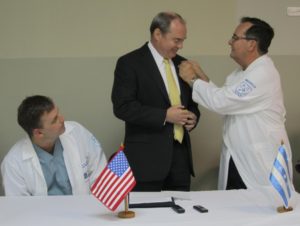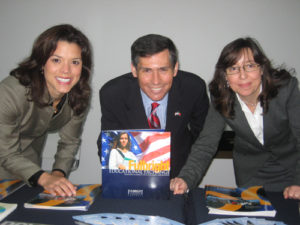From ‘Observing and Reporting’ to ‘Advocacy and Lobbying’
 Working saved David Lindwall’s life — literally. He was deputy chief of mission at the U.S. Embassy in Haiti in January 2010, when a catastrophic earthquake flattened his house. He felt very lucky to be in the quake-resistant embassy building when the earth shook.
Working saved David Lindwall’s life — literally. He was deputy chief of mission at the U.S. Embassy in Haiti in January 2010, when a catastrophic earthquake flattened his house. He felt very lucky to be in the quake-resistant embassy building when the earth shook.
His colleague Victoria DeLong, however, wasn’t that lucky — she was killed when her house collapsed. Overall, hundreds of thousands of people and a quarter-million buildings perished. DeLong, who was the embassy’s cultural affairs officer, spent 27 of her 57 years in the Foreign Service.
For American diplomats serving abroad, natural disasters, along with terrorist attacks, carjackings, kidnappings, robberies and even murder, are part of their way of life. Yet many, including Lindwall, are drawn to dangerous postings more often than to plush ones. After Haiti, the poorest country in the Western Hemisphere, Lindwall went to Iraq. He cut short his next assignment as consul-general in Guayaquil, Ecuador, to serve in Afghanistan, where he is currently the deputy chief of mission.
“Even though not every officer has had such experiences, dealing with disasters is very much a part of the Foreign Service life,” Lindwall said. “After my house in Haiti collapsed, I slept with the Marines that first night. The second night, the Marines brought a cod, a pillow and a blanket into my office. I slept there for about six weeks…”
>> READ THE FULL STORY ON THE HUFFINGTON POST

 Gavin Sundwall stood beside the grave, a Bible in hand, and read John 11:25-26: “I am the resurrection and the life…” Two taxi drivers, who had become the deceased woman’s chauffeurs during the last years of her life, shared memories of her and shed tears. They sprinkled the woman’s ashes over the graves of her two husbands, which were just a few feet apart.
Gavin Sundwall stood beside the grave, a Bible in hand, and read John 11:25-26: “I am the resurrection and the life…” Two taxi drivers, who had become the deceased woman’s chauffeurs during the last years of her life, shared memories of her and shed tears. They sprinkled the woman’s ashes over the graves of her two husbands, which were just a few feet apart.